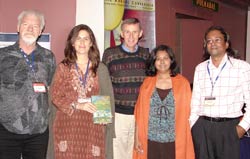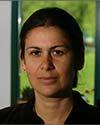2007-Ongoing
The book South Pacific Islands Communication was launched at the 17th AMIC conference, Manila, Philippines. The main objective of this project is to establish a South Pacific Islands Communication Forum under the aegis of the Pacific Media Centre and Asian Media Information and Communication Centre (AMIC) in Singapore. The Forum provides a common platform for an in-depth analysis of communication issues in the region; promote a dialogue between South Pacific Islands and the rest of Asia, encouraging a better understanding of each other and promoting inclusiveness of South Pacific countries in pan-Asian events.
 South Pacific Islands Communication Forum (SPICF) coordinator: Associate professor Evangelia Papoutsaki
South Pacific Islands Communication Forum (SPICF) coordinator: Associate professor Evangelia Papoutsaki
AMIC New Zealand country representative: Associate professor David Robie
Geographical area:
Micronesia, Polynesia, Melanesia (and NZ, Australia, USA for diaspora Pacific Islands media)
The project’s main aims:
1. Create a network of specialists (academics, professionals, media and related organisations representatives) with a data base
2. Establish an annual event
* a round-table
* a separate session at the PIMA and AMIC annual conferences focusing on SPIC issues
3. Promote research and publications
The Forum will seek to identify and address the following issues:
* What are the main characteristics of the smaller Asia/South Pacific nations regarding information and communication flow?
* Are they facing different issues to their bigger neighbours?
* How can we promote dialogue and cooperation between SPI and other Asia Pacific countries?
* What are the factors defining these issues (geography, population, economy, culture, technology, politics)?
* How are they addressed (communication policies, civil society, training)?
* Are there any common issues (small markets, linguistic and ethnic fragmentation)?
* What is the impact of their bigger neighbours on local media content and practices?
* What is the impact of globalisation in terms of media consumption and cultural diversity?
* What roles do or can new media and ICT technologies play in strengthening the communication and information flow in these countries?
Supporting organisations/institutions:
Pacific Media Centre (AUT University); AMIC Singapore; University of South Pacific, other regional organisations and institutions (UNESCO, Regional Media Councils)
Significance
Most of the Melanesian, Polynesian and Micronesian microstates have been left out of the main communication developments caused by a number of reasons such as vast distances, scattered populations, traditions, persisting colonial influences, poor economies and unstable political regimes, lack of infrastructure, fragmented and insignificant market places for both goods and ideas. The consequences for their regional integration and most importantly their development as societies are many and yet not addressed and debated.
Firstly, the impact of the forum in Asia and the Pacific lies in the comparison it enables between different regions and countries of different levels. This leads to a better understanding of what affects the communication and information flow in smaller nations.
Secondly, this forum will bring together a number of specialists from the region to share their knowledge. It will promote research and a better understanding of South Pacific Islands within the Asia region. There is little knowledge amongst Asian media specialists about the communication profile of these islands and their needs. The South Pacific Islands are significantly absent at Asian communication forums. From an Asian perspective the South Pacific remains an unknown vacuum.
Further, training and other activities often tend to be initiated and dominated by Australia as the regional power. Regional organizations such as PINA and PIMA have provided a forum for media issues. However, they have not in the past provided research opportunities and other academic activities. The proposed forum would be well placed to do so because it would develop from within the region and could meet the perceived needs of these countries.
Dr Valia Papoutsaki (Divine Word University in PNG), and Shailendra Singh and Dr Som Prakash (University of the South Pacific, Fiji) at the Penang conference Pacific stream.
Past events and actions
1. South Pacific Islands Communication Forum, Session at the AMIC Annual Conference Media in Asia: Aspirations, Choices and Realities 15th AMIC Conference, Penang, 17-20 July 2006
2. Pacific Islands Communication: Local Issues, Regional Perspectives (by Evangelia Papoutsaki & Usha Harris). An edited volume in progress including the papers presented at the SPICF AMIC session and past AMIC conferences co-funded by the Pacific Media Centre, USP and AMIC.
Pacific media paper abstracts
Singapore 2007
Eggins, Joyce (2007). Community development and church-based radio broadcasting in Papua New Guinea (abstract) Paper presented at 16th AMIC conference, Singapore, 24-27 June.
Papoutsaki, Evangelia (2007). Decolonising journalism curricula: a research and 'development' perspective (abstract) Paper presented at 16th AMIC conference, Singapore, 24-27 June.
Robie, David (2007). Foreign aid in Pacific media education: Panacea or Pandora's box? (abstract) Paper presented at 16th AMIC conference, Singapore, 24-27 June.
Penang, Malaysia 2006 (SPICF)
Crocombe, Ron (2006). Elite communication between the Pacific Islands and Asia: A new paradigm evolving - South Pacific Islands Communication Forum keynote paper (abstract), AMIC 15th conference ‘Media in Asia: Aspirations, Choices and Realities’, July 17-2, Penang, Malaysia.
Matbob, Patrick and Papoutsaki, Evangelia. (2006). West Papua in the Papua New Guinean press: 'My brother, my enemy' (abstract). Paper presented at the 15th AMIC conference, Penang, Malaysia.
Moala, Kalafi (2006). Independent media conflicts in Pacific Island nations - South Pacific Islands Communication Forum paper (abstract), AMIC 15th conference ‘Media in Asia: Aspirations, Choices and Realities’, July 17-2, Penang, Malaysia.
Molnar, Helen (2006). Informing Citizens: opportunities for media and communications in the Pacific - South Pacific Islands Communication Forum paper (abstract), AMIC 15th conference ‘Media in Asia: Aspirations, Choices and Realities’, July 17-2, Penang, Malaysia.
McManus, Michael (2006). Domestic Violence, Youth and Media Reporting in Papua New Guinea - South Pacific Islands Communication Forum paper (abstract), AMIC 15th conference ‘Media in Asia: Aspirations, Choices and Realities’, July 17-2, Penang, Malaysia.
Prakash, Som & Singh, Shailendra (2006). Politics, Democracy, and the Media: Case Studies of Fiji, Tonga and the Solomons - South Pacific Islands Communication Forum paper (abstract), AMIC 15th conference ‘Media in Asia: Aspirations, Choices and Realities’, July 17-2, Penang, Malaysia.
Beijing 2005
Papoutsaki, Evangelia and Sharp, Steve (2005). Island nations in the South Pacific and their communication needs: From a journalism education perspective (abstract). Paper presented at 14th AMIC conference in Beijing, China, 18-21 July.
Robie, David (2005). South Pacific notions of the Fourth Estate: A collision of media models, culture and values (abstract). Paper presented at 14th AMIC conference in Beijing, China, 18-21 July.
Bangkok 2004
Rooney, D. , Papoutsaki, E., and Pamba, K. (2004). A country failed by its media: a case study from Papua New Guinea (abstract). Paper presented at 13th AMIC conference, Bangkok, Thailand. 1-3 July.



